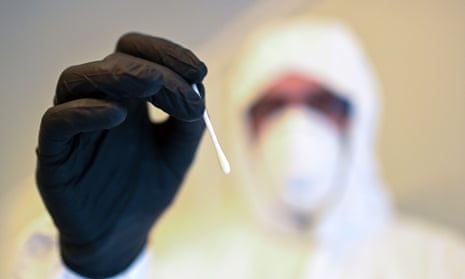Two new tests for Covid-19 that are said to deliver results within 90 minutes are to be introduced across NHS hospitals and care homes, to speed up diagnosis ahead of winter and differentiate coronavirus infection from flu, the government says.
But some experts were surprised by the government’s decision, saying the particular tests were not well-known. No data had been published concerning their evaluation. The government had made mistakes in buying tests that turned out to be sub-standard in the past, they said.
“Repeatedly through the pandemic the government has raced ahead purchasing tests on the basis of manufacturer’s claims, and have found later when independent studies are done that the tests do not have adequate performance for use in the NHS,” said Professor Jon Deeks from Birmingham University, part of a team who have been evaluating tests of this sort.
“We would hope that the government would wait for proper evaluations, and consider the scientific evidence for all available tests before signing further contracts. The mistakes made in test purchasing have wasted millions of pounds as well as put lives at risk.”
One of the new tests is made by DnaNudge, a company that analyses people’s DNA from saliva in order to sell them a wristband and smartphone app that will “nudge” them towards healthy food choices. “We’re all different because our genetic make-up is different, in fact your DNA is unique to you. This genetic code also determines which foods are good or bad for us,” says its website.
Their Covid-19 test, using nasal swabs, will be rolled out across NHS hospitals from September. The company is supplying 5,000 “Nudgeboxes” that process the tests, up to 15 a day, with the aim to provide 5.8m tests in the coming months, said the Department for Health and Social Care. The boxes have already been trialled in eight London hospitals.
The other test, called LamPORE, is made by Oxford Nanopore and can analyse saliva as well as nose swab samples. A desktop machine can process 15,000 tests a day and a portable palm machine, which can be taken to outbreaks or institutions where a “pop-up” lab is needed, can do 2,000.
From next week, 450,000 of the new LamPORE tests will be available across adult care settings, NHS laboratories and lighthouse laboratories, with millions more tests to be rolled out later in the year, said the DHSC.
“We’re using the most innovative technologies available to tackle coronavirus. Millions of new rapid coronavirus tests will provide on-the-spot results in under 90 minutes, helping us to break chains of transmission quickly,” said health secretary Matt Hancock.
“The fact these tests can detect flu as well as Covid-19 will be hugely beneficial as we head into winter, so patients can follow the right advice to protect themselves and others.
“I am hugely grateful for the excellent work done by DnaNudge and Oxford Nanopore to push forward these life-saving innovations in coronavirus testing.”
Prof Deeks said he and colleagues had not come across either of the new tests. “We cannot emphasise how important it is to see independent evaluations of all tests before they are implemented. Both of these technologies are new, and it is unclear what evaluations have been done. We cannot find any independent studies or even claims about their performance on the company websites. They are not listed on the main international lists of available and approved tests.”
Deenan Pillay, professor of virology at UCL, also said he worried that the government was purchasing tests that were yet to be fully evaluated, particularly outside of the usual healthcare settings.
“They may be very good, and if so that’s great (although the data must be made available for scrutiny, and to avoid any suspicion of conflicts of interests),” he said.
But the critical component of all diagnostic tests, however good, is the pathway from identifying those who need it and obtaining appropriate samples through to getting the results and ensuring action is taken, be it contact tracing or helping those with a positive test to get advice and care.
“Since this [test] now includes other viruses in addition to covid which may circulate widely in winter then the list of potential actions are amplified,” he said.
